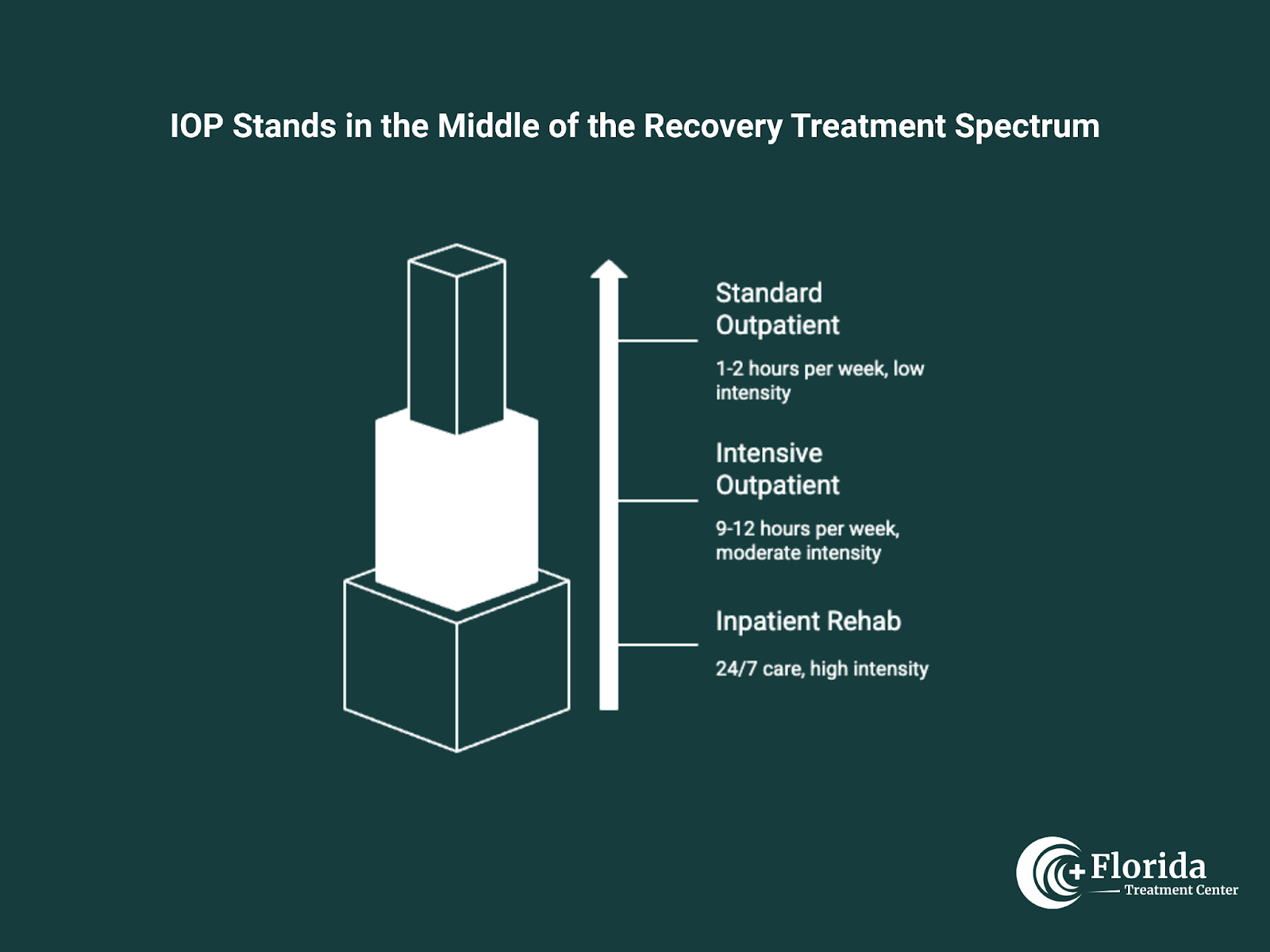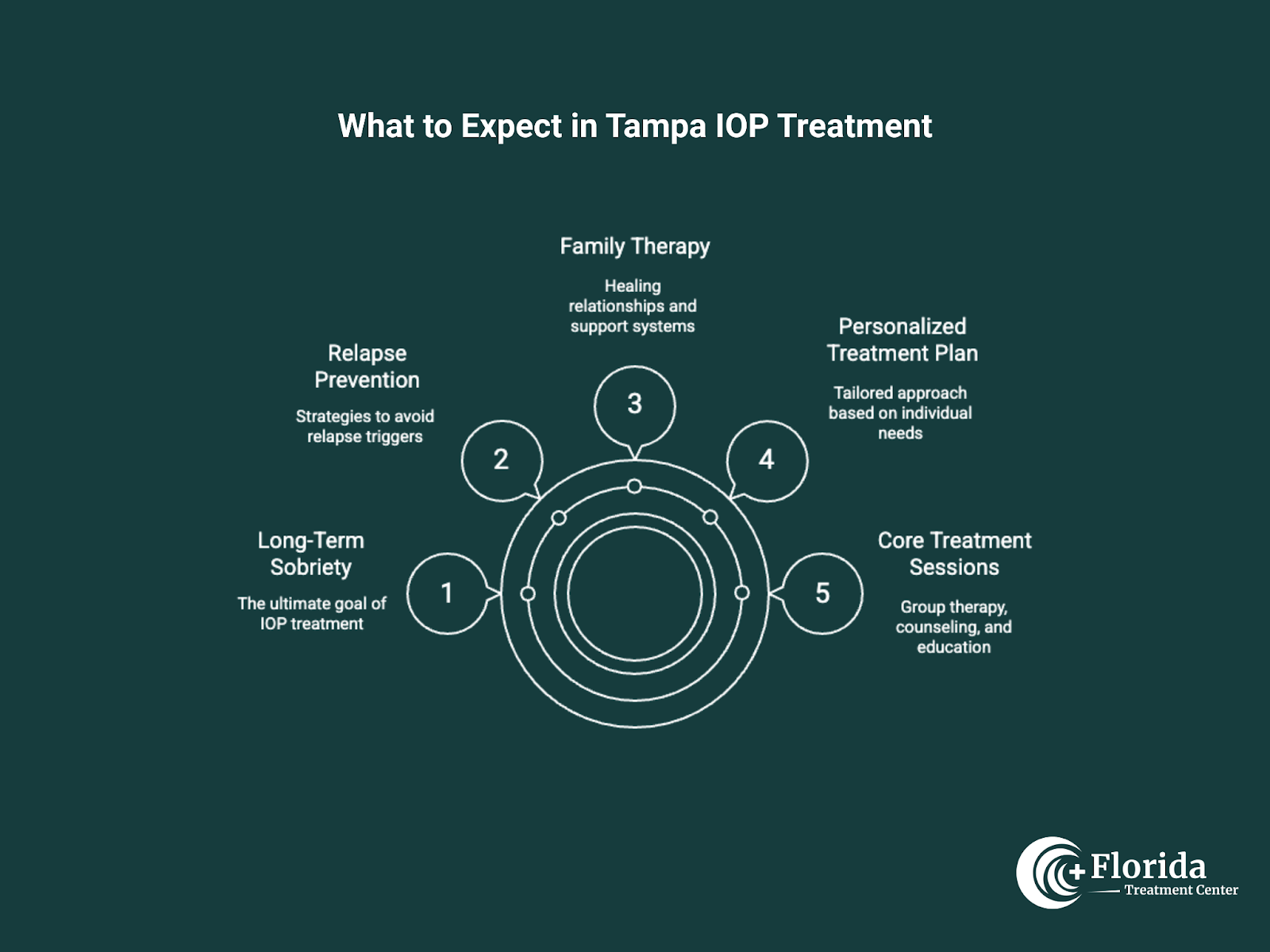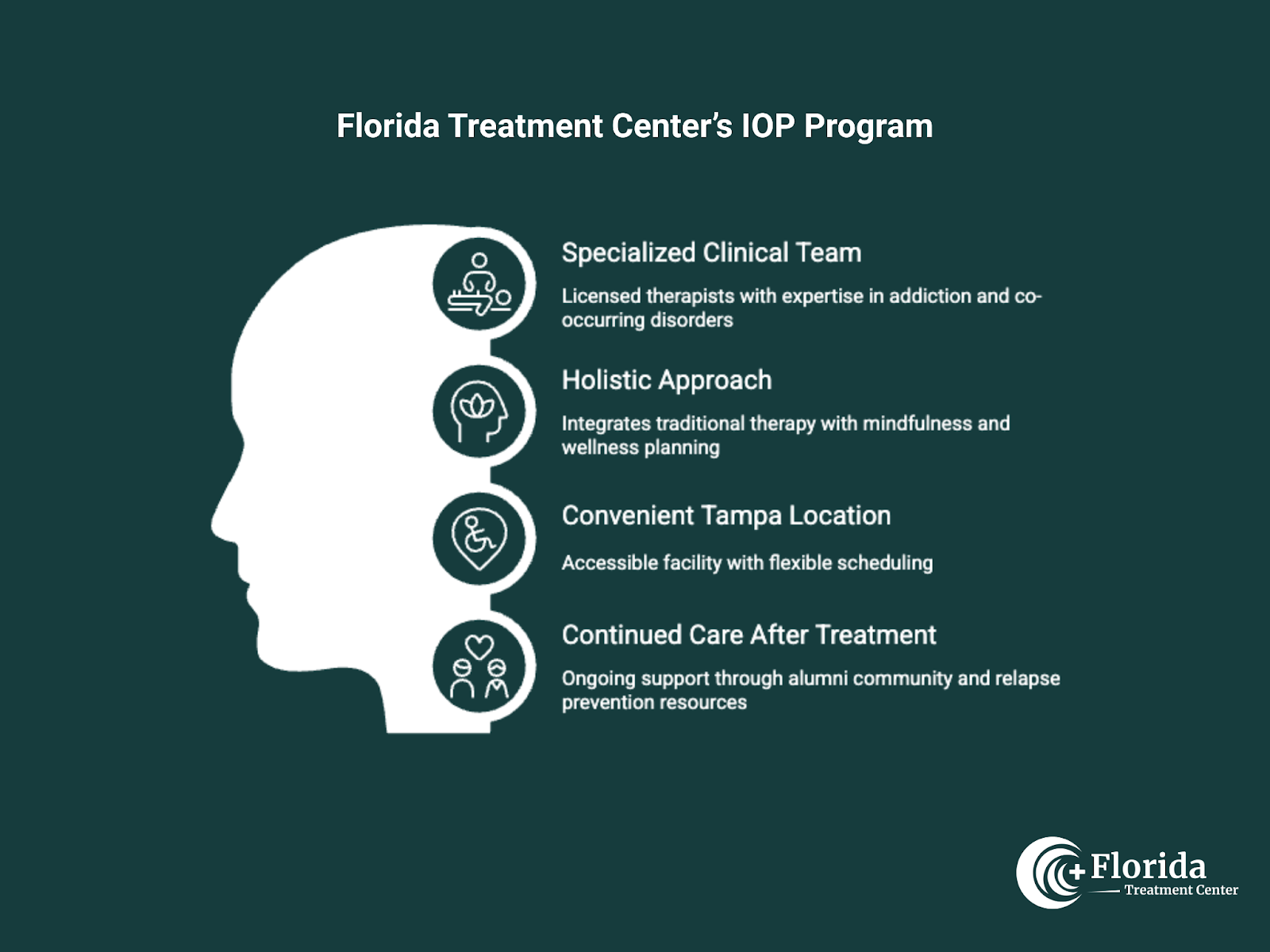
Deciding to get addiction help is tough enough. Figuring out how to stop your whole life while you do it makes it even harder. Maybe you've thought about treatment but leaving your job for three months? Impossible. And you've got kids who need you. Bills that won't pay themselves. An IOP in Tampa gives you legitimate, professional addiction treatment without requiring you to check into a facility and disappear from your life. You show up for sessions several times a week, do the work, then go home to your actual responsibilities. Not the easy way out, just the way that works when residential rehab isn't realistic. At Florida Treatment Center, we designed our intensive outpatient program around something obvious that a lot of treatment centers ignore: most people can't just vanish for 30 to 90 days. Our program fits the reality of your life. Your job still expects you Monday morning. Your kids still need dinner. Your rent is still due.
An intensive outpatient program sits in that middle space between living at a rehab facility and seeing a therapist once a week. The bridge between those two extremes. IOP typically means 9 to 12 hours of treatment per week, spread across three to five days. A real commitment, not as all-consuming as inpatient rehab where you're there 24/7, but way more intensive than standard outpatient counseling where you might only go once or twice a week for an hour.

Most people end up in IOP one of two ways:
Primary treatment approach
Some use it as their primary treatment because things are serious but they don't need someone watching them 24/7. They have a stable living situation, they're not in immediate danger, but seeing a therapist once a week isn't going to be enough.
Step-down care
Others come to IOP after finishing more intense treatment. They did detox first, then residential or a partial hospitalization program. Now they want more freedom but aren't ready to be completely on their own. This gradual approach works really well. Going from detox to inpatient to IOP and then to regular outpatient gives you a realistic path back to normal life instead of jumping straight from intensive care to figuring it out alone.
What separates IOP from both inpatient and traditional outpatient? You're learning recovery skills and immediately testing them in your actual environment. Not practicing sobriety in some controlled setting where all the triggers are removed. You go home every night. You deal with your boss, your family, your neighbors, your normal stress. All the stuff that used to make you want to use, it's still there. But now you've got therapists and a whole support system helping you navigate it in real time.
Choosing an intensive outpatient program in Tampa means more than just convenient geography, though staying local matters more than people realize. You recover in your own community. Your family and friends are nearby. You're not isolated in some facility three states away, wondering what's happening at home.
IOP gives you regular sessions to keep you accountable, but the schedule bends to fit your real life. Florida Treatment Center has evening and weekend sessions for people with jobs or kids:
You get serious help without quitting your job or burning through PTO. Important when you need that paycheck or can't risk losing your position.
Tampa IOP treatment at our facility integrates proven therapeutic approaches:
This isn't therapy fad language. These are methods backed by decades of solid research showing they help people recover from addiction. When you're searching for drug rehab Tampa or alcohol treatment Tampa, these proven techniques are what make the difference between relapse and recovery. This time you try that skill you just learned. Thursday you're back in group or individual therapy talking about how it went. What worked, what fell flat, what you need to tweak. Your therapist helps you adjust. That immediate practice and feedback loop builds confidence faster than any other treatment model. You're not waiting until after discharge to find out if you can handle normal life without substances. You're proving it to yourself every single day during treatment.
Walking into addiction treatment the first time is nerve-wracking when you don't know what to expect. IOP uses a structured format so you know what's happening.

Everything starts with an assessment when you first come in. We ask about your substance use history, what mental health stuff is going on alongside the addiction, where you're living, who's in your corner, and what you want out of treatment. Your treatment team builds a plan based on what you told us. Not a one-size-fits-all thing where everyone gets identical treatment, but something designed for your specific situation. As you go through the program, that plan changes with you. Something working well? We lean into it more. Something not clicking? We adjust.
Addiction doesn't just affect the person using substances. It damages relationships with partners, kids, parents, siblings. Family therapy is built into our program to:
Sometimes family members are eager for these sessions because they've been desperate to help but didn't know how. Other times the person in treatment is terrified to face family because of all the hurt they've caused. Bringing everyone into the process makes recovery stronger either way.
Relapse prevention stays front and center throughout everything. You're learning to:
Real skills you'll use every day to stay sober after treatment ends, not theory you might apply someday.
IOP works well in certain situations. It's not right for everyone. Figuring out where you are helps you know if this level of care makes sense.
Finished detox, residential treatment, or a partial hospitalization program (PHP)? IOP is usually the next step that makes sense. You've done the hard early work of getting sober and learned the basics. But you're not ready to handle everything alone with just weekly therapy yet. IOP gives you that middle ground: more independence than residential care, but significantly more support than standard outpatient.
Your addiction has gotten serious. It's messing with your work, damaging relationships, taking a toll on your health. Once-a-week therapy won't be enough to fix it. But you're not in medical danger. You have somewhere safe to sleep. You don't need constant supervision. A lot of people searching for IOP near me in Tampa are in exactly this spot.
You're motivated to get better, but willpower alone isn't enough. You need:
But you also have responsibilities that matter, a job that pays your rent, kids who need their parent present, school classes you can't miss. IOP respects those realities while still giving you intensive treatment. Stability is the key factor. IOP works best when you've got at least a foundation, a place to sleep, a few supportive people, no immediate medical crises. If things are completely chaotic or you're in medical danger from withdrawal, you probably need a higher level of care first.
Tampa has plenty of addiction treatment options. What makes us different:

Specialized Clinical Team
Our therapists hold licenses and master's degrees. They specialize in addiction and co-occurring disorders. Not people who took an online course and printed a certificate. These are clinicians who've been doing this work for years. Most clients walking through our doors have more going on than just substance abuse. Depression shows up. Anxiety shows up. PTSD. Our therapists tackle all of it together, because patching up the addiction while your mental health falls apart just sets you up to fail later.
Holistic Approach
We go beyond traditional therapy. Proven approaches like CBT and DBT are part of it. We also work with mindfulness, wellness planning, and recovery coaching. We're addressing all of you: physical health, mental health, relationships, what gives your life purpose. Not just focusing on stopping the substance use and ignoring everything else.
Convenient Tampa Location
Our facility at 13328 Telecom Dr. is accessible, and our scheduling is genuinely flexible. Evening and weekend sessions exist specifically so you don't have to choose between treatment and keeping your job. We designed the program around the reality of people's lives.
Continued Care After Treatment
Our support doesn't stop when you complete the program. You'll get:
Recovery takes unexpected turns. Having somewhere to turn during rough patches, without feeling like you've failed, can make all the difference.
Getting started is straightforward:
1. Free Assessment
Contact Florida Treatment Center for a confidential conversation about where you are and whether IOP is the right fit. No pressure, no judgment.
2. Insurance Verification
We work with most major insurance plans and help you understand what your coverage includes. Our goal is removing barriers between you and getting help.
3. Program Orientation
Once everything's sorted, we walk you through orientation and get you scheduled for your first sessions. The whole process usually happens quickly: days, not weeks.
You don't have to wait for some perfect moment. You don't need to hit an imaginary "rock bottom" before you're worthy of help. If some part of you is wondering whether it's time to get help, that's probably your answer. You can keep your job. Stay connected to your family. Handle your responsibilities. And get intensive treatment for addiction that actually works. Those things aren't mutually exclusive.
Contact Florida Treatment Center today:
Our team will answer whatever questions you have, check your insurance coverage, and walk you through what comes next. You don't need to have all the answers before you call. You just need to pick up the phone. People are getting sober right here in Tampa. You don't have to figure this out by yourself, and there's no reason to wait.
Psychologists and psychiatrists both work in the mental health field, but they differ in their approaches. Psychologists primarily use talk therapy and counseling to address emotional and behavioral issues, while psychiatrists are medical doctors who can prescribe medication in addition to therapy.
Stay informed about the latest research in psychology.
Outpatient offers flexible treatment to receive therapy and support while maintaining work, family and/or school.
PHP offers the most structured and intensive level of care while allowing clients to return home at the end of the day.